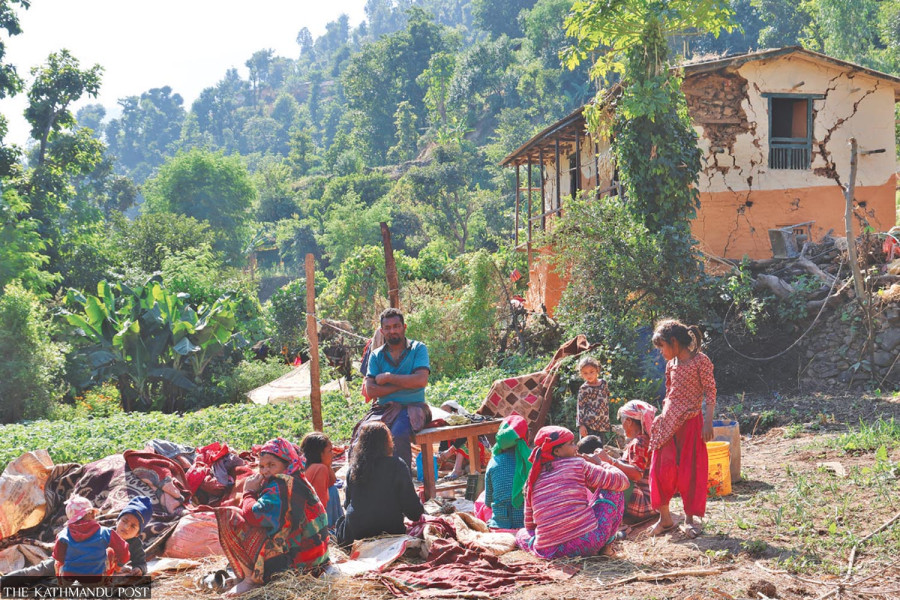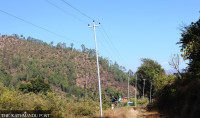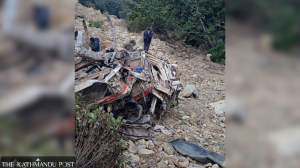Karnali Province
Children in quake-hit areas in need of physiological counselling
Many of those orphaned in the disaster are under mental duress as they struggle to recover from the trauma.
Mahesh KC
A 12-year-old boy from Banke Pipalgaura in ward 14 of Athbiskot Municipality lost his mother in the November 3 earthquake. His world hasn’t been the same again. The boy, who lives under a tarpaulin tent with his father and two older brothers, can be mostly seen lost in thought.
His father, Naru Malla, has been trying to pull his son back from his thoughts and get him to take part in the world around him. “The trauma of losing his mother at such a young age has traumatised my son,” said Malla. “I’ve been trying hard to cheer him up, but he doesn’t want to talk to anyone. He sits alone and is always distrait.”
Maya Gharti Oli, the mother of two children—a 6-year-old son and a year-old daughter—has also tried everything to rouse her son from his stupor since he lost his father in the earthquake. Putting aside her own trauma of losing her husband, she has been trying to take care of the children.
Oli and her children, residents of ward 4 of Sani Bheri Rural Municipality, have also been living under a tarpaulin tent alongside other displaced families. “I lost my will to live when I lost my husband in the earthquake. But I have to keep going for my children,” she said. “I’m worried about them, especially my son who hasn’t been able to overcome the trauma of the earthquake and is yet to come to terms with losing his father.”
On November 3, a magnitude 6.4 earthquake rocked western Nepal at around midnight killing at least 153 people in the two districts of Jajarkot, the quake’s epicentre, and in Rukum West. A total of 101 people died in Jajarkot while 52 fatalities were reported in the adjoining Rukum West. Property worth billions of rupees reduced to rubble, with reports of 35,455 houses partially damaged and 26,557 completely destroyed.
According to the data of the local units of West Rukum, 42 people from Athbiskot Municipality, 10 from Sani Bheri Rural Municipality, and one from Chaurjhahari Municipality died in the earthquake. Around 17 children from Athbiskot Municipality and three from Sani Bheri Rural Municipality lost their parents and their home that night.
Manbir Oli, a child rights officer in Sani Bheri Rural Municipality, says children who lost their parents and loved ones in the quake are under great psychological duress and have not been able to recover from the pain and trauma.
“Everyone is struggling to come to terms with the loss, but the children are suffering the most,” said Oli. “They don’t know how to process the trauma of losing their loved ones, especially their parents.”
Indra Bahadur Bista, head of the education unit of Athbiskot Municipality, said absenteeism among school children has increased in the earthquake-affected areas.
“It was a given that children would not be able to attend school in the aftermath of the earthquake. The children living under tents and those who have lost their parents have not returned,” said Bista. “Those who are attending school have also not been able to concentrate on their studies.”
Shashi Sunar Kami from ward 10 of Athbiskot Municipality lost her husband and her home in the earthquake. She has since then been living under a tarpaulin tent with her five children, all under the age of 19.
Kami said none of her children has gone back to school.
“We are all exhausted. My children miss their father and I don’t know how to cope with the loss of my husband,” she said. “I don’t know how I will take care of them all alone.”
Kami is among the displaced who received government aid for the construction of a temporary shelter. “I have started the shelter’s construction. I try to keep myself busy with work. My children are still scared and turn to me for solace so I try my best to keep their fears at bay.”
According to Ravi KC, mayor of Athbiskot Municipality, the local unit is collecting data on children affected by the earthquake who are under mental stress. “Children who lost one or both of their parents are in immediate need of counselling. We will make arrangements to provide counselling to the children,” said KC. “We are also in talks with the higher authorities to offer free education to the children whose families are in dire financial situations.”
Birkha Bahadur Bista, chairman of Sani Bheri Rural Municipality, says his office is also arranging to provide psychosocial and physiological counselling and emotional support to children in affected areas. “These children not only need better physical care, they also require counselling to help them overcome the trauma of the earthquake and of losing their loved ones,” said Bista.




 13.12°C Kathmandu
13.12°C Kathmandu












